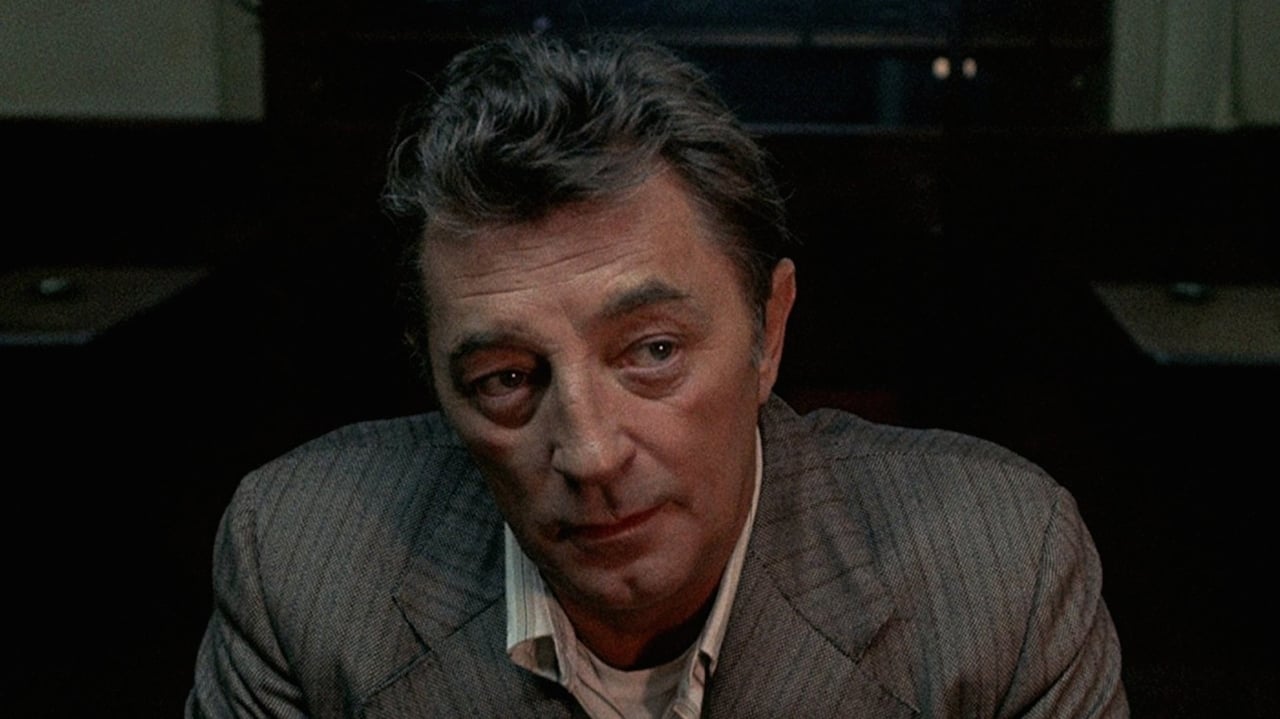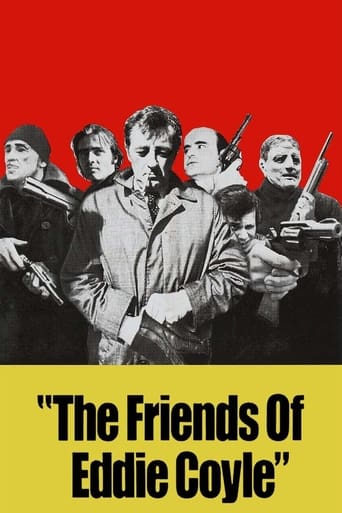

What a waste of my time!!!
... View MoreI am only giving this movie a 1 for the great cast, though I can't imagine what any of them were thinking. This movie was horrible
... View MoreClever and entertaining enough to recommend even to members of the 1%
... View MoreClose shines in drama with strong language, adult themes.
... View MoreAdapted from the novel of the same name by George V. Higgins, director Peter Yates' The Friends of Eddie Coyle takes pride in its authentic depiction of 1970s Boston, where Irish mobsters trade weapons and organise truck hijackings over a diner table. It follows low-level criminal Eddie 'Fingers' Coyle, played by Robert Mitchum, as he faces a lengthy spell in prison for a crime organised by bartender associate Dillon (Peter Boyle). His only hope of avoiding jail time is a recommendation to the District Attorney's office, which may put him good favour with the judge. ATF agent David Foley (Richard Jordan) sees the opportunity to further his own career by promising Eddie he'll put in a good word as long as the career criminal feeds him solid intelligence.Mitchum is perfect as a man who has grown tired of risking his livelihood for his bosses, having grown old with little to show for it other than some extra knuckles gained from having his hand slammed into a drawer by a rival. Coyle is well-connected and reliable, with a keen eye for a good business deal. Yet as his superiors have grown rich, he still lives in a shabby neighbourhood, saving up any pennies he can. He purchases guns from the wild yet competent young gun-runner Jackie Brown (Steven Keats), but sees an opportunity to prove himself useful to Foley, who actually has more informants within Coyle's underworld than the old man realises. Coyle understands that this is his last chance to escape the world he has become weary of, and spend his remaining years enjoying the sunshine. Yet his information never seems to be enough for Foley, and as the rate of successful arrests rapidly increases, it isn't long until his 'friends' become suspicious.The Friends of Eddie Coyle could have only been made in the 1970s, when studios in Hollywood were more open to taking risks and allowed writers to tell the story they wanted to tell. This is about as unsentimental and understated as crime dramas get, shot by cinematographer Victor J. Kemper in a loose style more akin to documentary than thriller. The tone is almost nihilistic at times, mirroring the mindset of the majority of the film's shifty characters. It makes for riveting viewing, with Mitchum delivering one of his finest performances in what was already a muscular career. The supporting cast is excellent too, with both Boyle and Keats utterly convincing as bottom-level scumbags, all of whom seem to exist in a state of constant paranoia and aggression. It will leave you incredibly cold, but only the very best crime sagas expose this dangerous world for what it actually is.
... View MoreAmerican film 'The friends of Eddie Coyle' welcomes viewers to a brutal world where policemen, bank robbers and arms dealers meet each other at regular intervals in order to show their superiority. Everything related to their work is shown in this film. It is a world where nobody could be trusted and everything works on instincts. It is in the midst of such an abrasive world that a gunrunner named Eddie Coyle is trying to strike a fine balance between his personal as well as professional lives. Although there are guns, criminals and gangsters, 'The friends of Eddie Coyle doesn't present itself as a violent film' as drama prevails over action scenes. The people whose company Eddie Coyle seeks are no ordinary guys. They have been depicted as mean, vicious for whom the realization of their own personal interests is something which matters the most. From this yardstick, there are not really Eddie Coyle's friends as he doesn't share their qualities. Actor Robert Mitchum was already a major star before the launch of this film. He deserves viewers' respect for playing an ordinary person's role who is unable to reform due to severe constraints in his profession. An air of authenticity surrounds the entire film especially in the manner in which it is depicted how some bank robbers are able to achieve their targets by catching bank managers unaware in the midst of their family.
... View MoreBeing fed up with the noisy expensive and ultimately empty blockbusters I've been watching recently what better than taking a trip back a few decades to a time when America made bloody decent films ? And the 1970s was a zenith of American film making . Too many classic movies to name or else I'd get through the one thousand word limit without naming half of them . THE FRIENDS OF EDDIE COYLE is not a title that springs to immediate attention when we're discussing great Hollywood movies from the 70s but for a forgotten crime drama where not much happens it is very compelling . It also has a supporting character called Jackie Brown so guess what modern day director loves this type of movie ? The late 1960s saw the birth of what became known as "New Hollywood" with BONNIE AND CLYDE often being quoted as the film that started the movement . New Hollywood had strong influences from the French New Wave of the 1950s which in turn was influenced by classic Hollywood especially the Warner Brothers studio best known for their gangster films . What New Hollywood and French New Wave did very well was bring a recognisable amorality to the storytelling . You might not agree with the characters motives but you can certainly understand where they're coming from . A middle aged man Eddie "Fingers" Coyle involved with the Boston mob finds himself facing jail time and if he comes up with useful information for the local police department so what's he going to do ? That's the premise of THE FRIENDS OF EDDIE COYLE . Eddie is played by Robert Mitchum and yet the star name is mainly missing for the bulk of the story and the narrative branches out in to several other characters story . There's Jackie the gun runner who is setting up an arms deal involving a couple of unlikely bank robbers . There's Jimmy Scalise who leads a crew that robs banks . There's Dave Foley a Boston detective who's trying to put a lid on crime in the city and uses people in a completely disposable way to get results and perhaps most memorable of all there is Dillon played by Peter Boyle who is a mob hit man but will do anything to survive inside or outside of the law . One thing New Wave and New Hollywood shared in common was that it didn't use star appeal in order to sell a movie hence Mitchum is used sparingly and it's Boyle who steals the movie . Another thing New Wave and New Hollywood shared was naturalistic performances . There's nothing showey , no "Hey look at me and what a fantastic theatrical performance I'm giving here" Everything is understated , the acting , the camera work and the editing . It might be rather talkative for some tastes and has a fairly low body count but despite being over 40 years old this remains one of the best films I've watched recently . . It also shows crime doesn't pay and there's no honour amongst thieves . Now that's a message you can't repeat often enough
... View More"The Friends of Eddie Coyle" is an overlooked little gem of a crime film that's notable for what it doesn't do, and that's inundate us with action or melodrama. It's the very matter of fact, unsentimental quality of the film that makes it something interesting and worth savouring. In its story of cops and crooks, it shows how there can be dishonour among thieves, especially if you're an ageing sad sack like Robert Mitchums' Eddie Coyle, and will do just about anything to avoid doing any more time. This experience benefits from capable storytelling and straightforward, no frills filmmaking. The cast is peppered with top notch veterans of supporting and character parts, Dave Grusins' score is just right, and the use of various Boston locations is excellent.Mitchum is great in the title role, managing to infuse him with some degree of likability. You shouldn't really be rooting for this guy, but Mitchum just might have you doing so. Eddie is looking at a long prison sentence, so he decides to start ratting on his underworld associates to dedicated detective Dave Foley (a typically solid Richard Jordan). Chief among them is gun runner Jackie Brown, played by Steven Keats. There's also a trio of robbers running around holding up banks, and Eddie knows who they are.The film co-stars talents such as Peter Boyle as saloon owner Dillon, and Alex Rocco and Joe Santos as Jimmy Scalise and Artie Van, two of the robbers. Buffs will delight in recognizing other players such as Mitch Ryan ("Lethal Weapon"), Peter MacLean ("Squirm"), James Tolkan ("Back to the Future"), Matthew Cowles ('All My Children'), and Jack Kehoe ("Serpico"). Director Peter Yates, who'd shown an impressive versatility over the years, moving from things like "Bullitt" to "The Deep" to "The Dresser" to "Krull", does an admirable job in creating this world of scummy people. One can imagine that a film of this kind might bore viewers with shorter attention spans, but it's richly rewarding for those looking for a little nuance and not just escapism.Scripted by producer Paul Monash, based on the acclaimed novel by George V. Higgins.Eight out of 10.
... View More